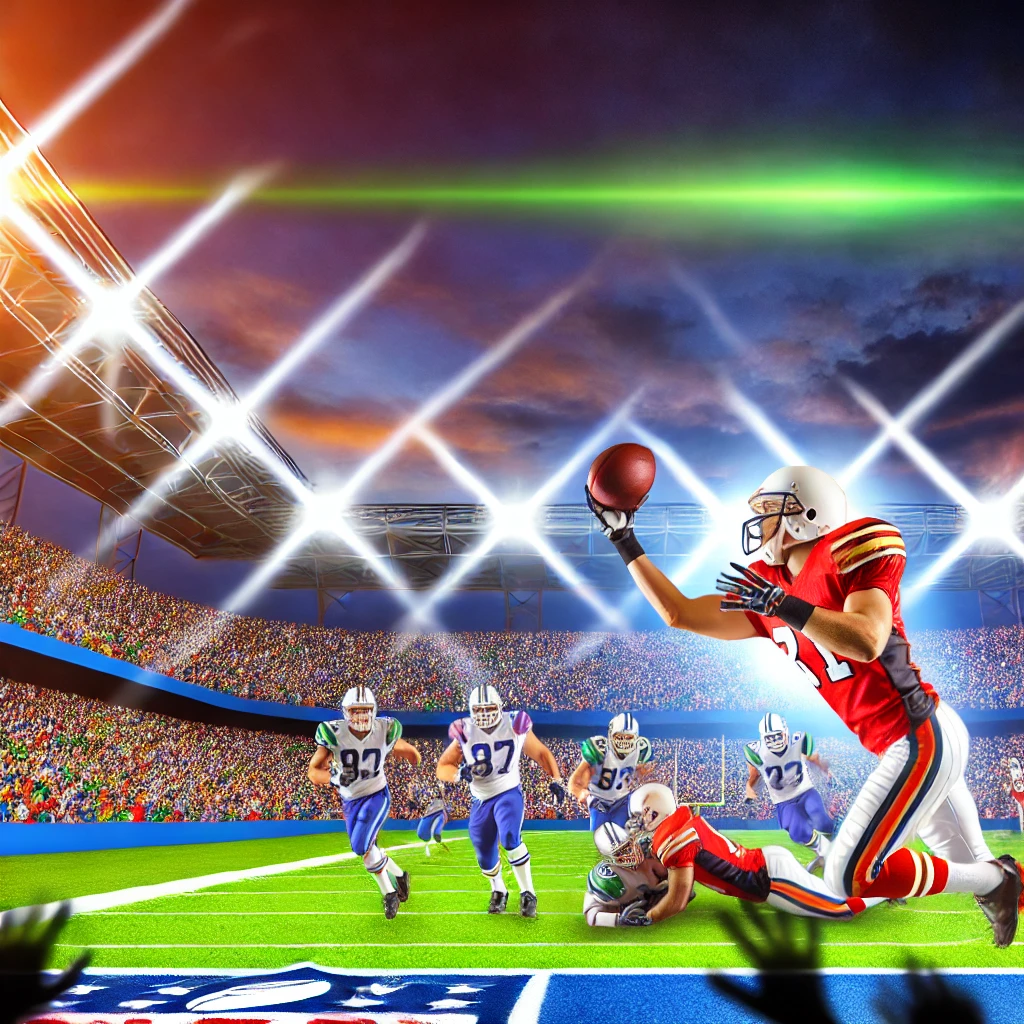The National Football League (NFL) is not just a sports organization; it’s a cultural phenomenon that has grown to become a significant part of American life. From thrilling Super Bowls to legendary players, the NFL has captivated audiences worldwide, with its history, popularity, and teams offering endless excitement for fans. Whether you’re a die-hard football lover or a newcomer to the game, understanding the NFL’s rich history and the teams that comprise it offers a window into why the league commands such a vast and dedicated audience.

Watch Football Online: A New Age of Accessibility
The digital age has revolutionized the way fans engage with sports, especially with the NFL. Watching football online has become a popular option for fans who want the convenience of enjoying games on the go. From live streaming platforms like NFL Game Pass to network-specific services such as ESPN, Fox Sports, and NBC, it’s easier than ever to watch football online from anywhere in the world.
Streaming services offer a multitude of options to follow your favorite teams, catch game highlights, and even stay up-to-date with NFL news. Whether it’s through mobile apps, web browsers, or smart TVs, the internet has opened up new ways for fans to interact with football content.
A Brief History of the NFL
The NFL’s history dates back to 1920 when it was founded as the American Professional Football Association (APFA). The league was renamed the National Football League in 1922, and over the next century, it would evolve into the largest professional football league in the world.
Initially, the NFL was a small organization with teams primarily based in small Midwest towns. The league’s structure was significantly different from today’s modern NFL, as there was no strict scheduling, and teams played varying numbers of games each season.
The NFL and the AFL Merger
One of the most critical moments in NFL history came in 1966, when the NFL merged with its rival, the American Football League (AFL). This merger transformed professional football in America, creating a united league with two conferences—the National Football Conference (NFC) and the American Football Conference (AFC).
This union helped establish the Super Bowl, which is now one of the most-watched annual sporting events globally. The first Super Bowl took place in 1967, and it has since grown into a spectacle that transcends the sport itself, attracting viewers for the game, the commercials, and even the halftime performances.
The Rise of Popularity: How Football Became America’s Game
Football’s rise to prominence in the United States can be attributed to a variety of factors, from its fast-paced gameplay to its inherent strategic depth. While baseball was once regarded as America’s favorite pastime, football has overtaken it, largely due to the NFL’s ability to modernize and adapt to the changing times.
Television’s Role in Football’s Growth
The explosion of television in the 1960s and 1970s played a pivotal role in the NFL’s surge in popularity. Networks like CBS, NBC, and ABC struck deals with the league to broadcast games nationally, allowing fans across the country to experience the excitement of football.
The development of prime-time programming, most notably “Monday Night Football,” also contributed to the NFL’s growth. “Monday Night Football,” which debuted in 1970, gave fans a dedicated slot to watch high-profile games, making football an essential part of American culture.
The NFL’s Global Reach
While football has traditionally been an American sport, the NFL has worked tirelessly to expand its reach globally. International games, most notably those played in London and Mexico City, have allowed fans from outside the United States to experience NFL games in person.
Digital media has also played a significant role in broadening the NFL’s global fanbase. Online streaming and social media platforms have made it easier for international audiences to follow the league and stay engaged with the latest NFL news and updates.
NFL Teams: The Powerhouses of the League
The NFL comprises 32 teams, split between the AFC and the NFC. Each team brings its own unique history, culture, and fanbase to the league. Here’s a breakdown of some of the most iconic teams that have left an indelible mark on the NFL.
Dallas Cowboys
- Conference: NFC East
- Super Bowl Wins: 5 (1971, 1977, 1992, 1993, 1995)
The Dallas Cowboys, often referred to as “America’s Team,” are one of the most popular and successful franchises in NFL history. With five Super Bowl titles and a fanbase that extends well beyond Texas, the Cowboys are a cornerstone of the league.
New England Patriots
- Conference: AFC East
- Super Bowl Wins: 6 (2001, 2003, 2004, 2014, 2016, 2018)
The New England Patriots, led by coach Bill Belichick and quarterback Tom Brady for much of their recent success, have become synonymous with winning in the 21st century. The Patriots hold the record for the most Super Bowl appearances (11), solidifying their place among the greatest teams in NFL history.
Pittsburgh Steelers
- Conference: AFC North
- Super Bowl Wins: 6 (1974, 1975, 1978, 1979, 2005, 2008)
The Pittsburgh Steelers have one of the most dedicated fanbases in the NFL. Known for their “Steel Curtain” defense, the Steelers’ dominance in the 1970s led to four Super Bowl titles during that decade, and they remain a perennial contender in the league.
San Francisco 49ers
- Conference: NFC West
- Super Bowl Wins: 5 (1981, 1984, 1988, 1989, 1994)
The San Francisco 49ers’ dynasty in the 1980s, led by Hall of Fame quarterback Joe Montana, made them one of the most successful franchises in NFL history. With five Super Bowl titles and a strong legacy of success, the 49ers are widely respected across the league.
Green Bay Packers
- Conference: NFC North
- Super Bowl Wins: 4 (1966, 1967, 1996, 2010)
The Green Bay Packers are one of the oldest and most storied franchises in NFL history. The team, owned by the fans through a public corporation, is known for its rich history, dating back to the league’s early days. The Packers won the first two Super Bowls and remain a beloved franchise in both Wisconsin and the broader NFL community.
Kansas City Chiefs
- Conference: AFC West
- Super Bowl Wins: 3 (1969, 2019, 2022)
The Kansas City Chiefs have recently emerged as one of the NFL’s premier teams, thanks in large part to the dynamic duo of quarterback Patrick Mahomes and head coach Andy Reid. After decades of playoff disappointments, the Chiefs have become a powerhouse in the 21st century, adding multiple Super Bowl titles to their résumé.

Key Milestones in NFL History
The NFL’s history is marked by several key milestones that have shaped the league into what it is today. Here are some pivotal moments:
The Founding of the NFL (1920)
The NFL was established in Canton, Ohio, in 1920, with 10 teams. This moment laid the foundation for the league’s future growth and success.
The First Super Bowl (1967)
Super Bowl I was played on January 15, 1967, between the Green Bay Packers and the Kansas City Chiefs. The Packers won 35-10, and the event began the Super Bowl tradition, which has since become one of the biggest sports events globally.
The AFL-NFL Merger (1970)
The 1970 merger between the NFL and the AFL created a unified league with two conferences, setting the stage for the modern NFL format.
The Creation of Monday Night Football (1970)
The introduction of “Monday Night Football” gave fans a dedicated night to watch games in prime time, which increased the NFL’s television presence and boosted its popularity.
The Establishment of the Salary Cap (1994)
The introduction of the salary cap in 1994 helped create parity within the league, preventing teams with higher revenues from monopolizing talent and giving smaller-market teams a better chance at success.
NFL’s Influence Beyond the Field
The NFL has become more than just a sports league—it’s a cultural institution. From halftime performances by some of the biggest names in music to commercials that have become a spectacle in their own right, the NFL touches all aspects of American entertainment.
The Super Bowl as a Cultural Event
The Super Bowl has evolved into a massive cultural event that transcends sports. With millions of viewers tuning in, it has become a platform for not only showcasing football talent but also for delivering iconic halftime shows and memorable commercials.
Fantasy Football and Fan Engagement
The rise of fantasy football has transformed how fans engage with the sport. Fantasy football leagues allow fans to create their own teams and compete against friends or strangers, adding another layer of excitement to the NFL season.
Social Media and the Digital Age
In the modern digital landscape, the NFL has embraced platforms like Twitter, Instagram, and TikTok to engage with fans in real-time. From live game updates to behind-the-scenes content, the league has used social media to expand its reach and deepen fan engagement.
The Future of Watching Football Online
As technology continues to evolve, so will the way fans watch football online. With the advent of 5G, virtual reality (VR), and augmented reality (AR), the future of football viewing is likely to be more immersive and interactive than ever before.
Virtual Reality (VR) Experiences
VR has the potential to revolutionize how fans experience NFL games. With VR headsets, fans could one day sit in a virtual stadium, experiencing the game from the best seat in the house—without leaving their living room.
Augmented Reality (AR) Enhancements
AR could enhance live games by providing real-time statistics and player information directly on your screen, offering a more enriched and engaging viewing experience.
Conclusion: Why the NFL Continues to Thrive
The NFL’s ability to evolve with the times, combined with its deep history and cultural significance, has allowed it to remain one of the most popular sports leagues in the world. From its humble beginnings in the 1920s to the spectacle that is the Super Bowl, the NFL has become an integral part of American and global culture.
With more options than ever to watch football online, fans can stay connected to their favorite teams and players, regardless of where they are. The NFL’s continued innovation, both on and off the field, ensures that the league will remain a dominant force in sports for years to come.

Leave a Reply